Share
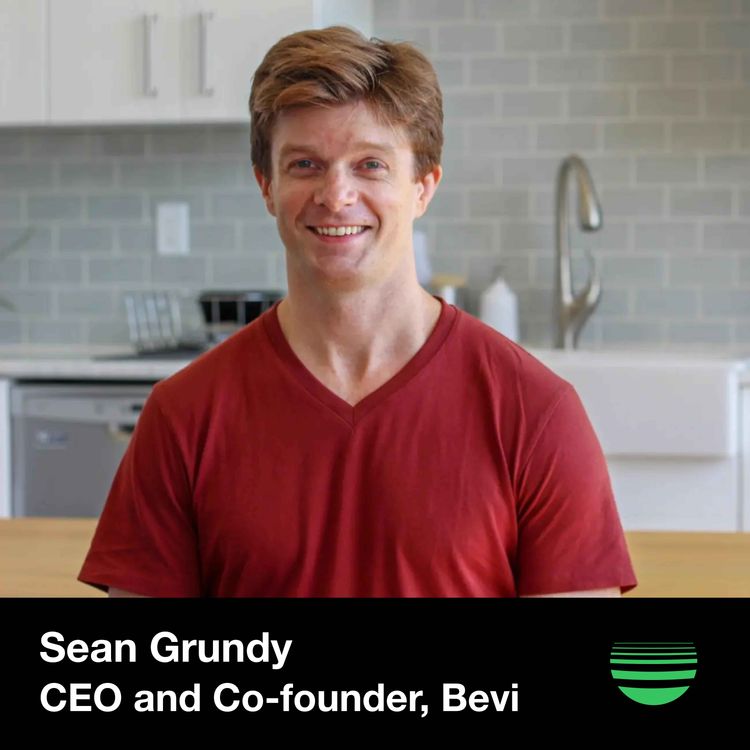
Give First
Bottoms Up: A Conversation with Bevi CEO Sean Grundy
Sean Grundy, co-founder and CEO of Bevi, wouldn’t budge despite calls from, ironically, David Cohen, the GiveFirst podcast host.
Cohen wanted Bevi smart water coolers in more places than just Boston. Grundy wanted to prioritize quality control and customer retention.
“We wanted our mechanical engineers and electrical engineers close by so they could personally put their eyes on any errors, see what was going wrong and fix it,” said Grundy.
That was back in 2014 just after participating in Techstars Boston. Grundy’s phased approach ethos worked then and still works today. In fact, Bevi not only survived the pandemic but recently raised $70 million in a series D funding round.
“The pandemic was brutal,” said Sean Grundy. “It felt like running into a wall.”
Listen in as Grundy and Cohen discuss taking a compassionate approach to crisis leadership, gradual recovery and redefining success … all with only a few liquid-related puns.
Follow David Cohen on Twitter @davidcohen
Listen & subscribe to the Give First podcast on Apple Podcasts, Spotify, and more.
More episodes
View all episodes
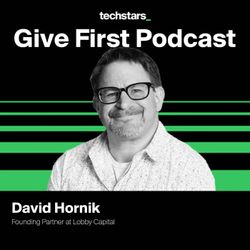
106. The Long Game of Venture and Generosity with David Hornik
28:51||Ep. 106In this episode of the Give First podcast, Brad Feld talks with David Hornik, founding partner at Lobby Capital.David shares how a relationship driven approach has shaped his career in venture capital, from investing to community building. He reflects on why generosity compounds over time, how trust creates durable networks, and why long term thinking matters in both business and life.The conversation also touches on the origins of the Lobby conference, David’s connection to Adam Grant’s Give and Take, and how the Give First mindset shows up in his work with founders, students, and investors.David Hornik LinkedIn ➡️ https://www.linkedin.com/in/davidhornik/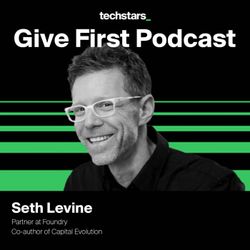
105. Rethinking Capitalism with Seth Levine
25:51||Ep. 105In this episode of the Give First podcast, David Cohen talks with Seth Levine, Partner at Foundry and co-author of Capital Evolution. Seth looks back on the early days of Techstars, the original Boulder community that shaped it, and how Foundry is approaching its final fund while still actively investing.The conversation explores why so many people are questioning capitalism today. Seth breaks down the decline in economic mobility, the growing wealth gap, and the rise of populism on both sides of the political map. He explains why he believes capitalism can still work, but only if more people have access to ownership and economic participation.Seth also shares insights from interviews featured in his book and highlights ideas like broader employee ownership, baby bonds, and modernized investing rules. He ties these themes back to the Give First mindset and how expanding opportunity can strengthen communities and the future of entrepreneurship.Seth Levine LinkedIn ➡️ https://www.linkedin.com/in/sethjlevine/ Get Capital Evolution here 📖 https://www.amazon.com/Capital-Evolution-New-American-Economy/dp/1637747780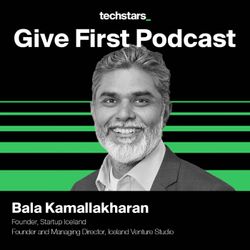
104. Starting and Closing a Bank in 3 Months with Bala Kamallakharan
49:08||Ep. 104In this episode of the Give First podcast, Brad Feld talks with Bala Kamallakharan, founder of Startup Iceland and a driving force behind the country’s modern startup ecosystem. Bala shares the remarkable story of moving to Mumbai to build an Icelandic bank in 2008, only to watch the entire financial system collapse overnight. Within three months, he went from launching a new bank to shutting it down, navigating canceled credit cards, emergency flights home, and the emotional aftermath of Iceland’s economic freefall.What followed was a personal reset. Returning to Iceland with no clear path forward, Bala began to rethink how the country could rebuild. His belief that new ideas and young founders could reshape the future led him to invest in early startups, create Startup Iceland, and champion the power of community-driven entrepreneurship. That work later earned him the Order of the Falcon, Iceland’s highest civilian honor.Bala reflects on uncertainty, resilience, and why believing in founders can transform not only companies but entire countries.Bala Kamallakharan LinkedIn ➡️ https://www.linkedin.com/in/balakamallakharan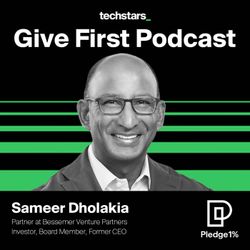
103. How Pledge 1% Sparked a Global Movement for Startup Philanthropy
22:35||Ep. 103In this special episode of the Give First podcast, Brad Feld and Sameer Dholakia revisit the origins of Pledge 1%, the global movement helping startups build philanthropy into their business from the start.What began as a simple conversation in Boulder between Brad and Rally Software co-founder Ryan Martens grew into a worldwide initiative championed by Salesforce, Atlassian, Techstars, and thousands of founders who have pledged 1% of equity, time, or product to social impact.Brad and Sameer trace how a local idea became a global force for good, fueling billions in new philanthropy and inspiring the next generation of founders to make giving part of their growth story.Sameer Dholakia ➡️ https://www.linkedin.com/in/sameerdholakia/ Pledge 1% ➡️ https://www.pledge1percent.org/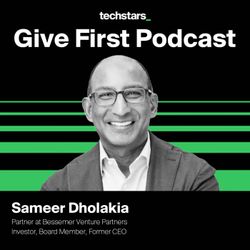
102. How Sameer Dholakia Led SendGrid to IPO and Exit
38:08||Ep. 102In this episode of the Give First podcast, Brad Feld sits down with Sameer Dholakia, partner at Bessemer Venture Partners and former CEO of SendGrid, the first Techstars company to go public.When Sameer joined SendGrid, growth was slowing and the company was losing money. Under his leadership, it became a $250M business, went public, and was later acquired by Twilio.Sameer shares the story of how his mother’s advice shaped his approach to leadership and why empathy and clarity became his greatest tools as a CEO. From his first days stepping into a nervous team, to navigating “oh sh*t” moments on the path to IPO, Sameer reflects on the lessons that defined his career, and how they continue to guide his work with founders today.Sameer Dholakia ➡️ LinkedIn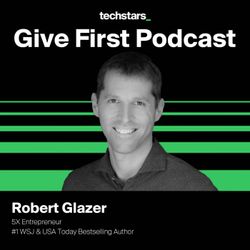
101. The Compass Within: Robert Glazer on Leading with Core Values
29:00||Ep. 101In this episode of the Give First podcast, Brad Feld sits down with Robert Glazer, 5x entrepreneur, #1 Wall Street Journal and USA Today bestselling author, and author of the new book The Compass Within.Robert shares his framework for uncovering personal core values, the principles that guide decisions, relationships, and leadership. The conversation explores why many people are climbing the wrong mountains, how self-awareness shapes growth, and why aligning words with actions may be the most important skill any founder or leader can develop.Find out more about Robert Glazer here ➡️ robertglazer.comFollow Robert Glazer on LinkedIn ➡️ linkedin.com/in/glazerThe Compass Within is out today, order your copy here ➡️ robertglazer.com/compassCheck out the Six Core Values Questions page ➡️ robertglazer.com/six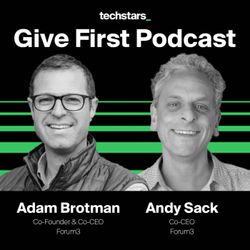
100. AI First Leaders | Andy Sack & Adam Brotman on Scaling with the AI Wave
24:36||Ep. 100In this episode of the Give First podcast, David Cohen sits down with longtime Techstars friend Andy Sack and former Starbucks Chief Digital Officer Adam Brotman, co-CEOs of Forum3 and co-authors of AI First: The Playbook for a Future-Proof Business and Brand.They explore why AI isn’t just another vertical, but the foundation of how companies will be built, operated, and scaled in the years ahead. Andy and Adam share insights from their work on what it means to be an “AI-native” founder, why iteration and prompting are becoming core entrepreneurial skills, and how disruption could lead to billion-dollar companies run by just a handful of people.The conversation covers practical takeaways for entrepreneurs, lessons from their entrepreneurial journeys, and why adopting an AI-first mindset may be the difference between thriving and being left behind in the next wave of innovation.Get Andy and Adam’s book ➡️ https://www.amazon.com/dp/B0D8TZDR74?ref=KC_GS_GB_US Follow Andy Sack on LinkedIn ➡️ https://www.linkedin.com/in/andysack/ Follow Adam Brotman on LinkedIn ➡️ https://www.linkedin.com/in/adambrotman/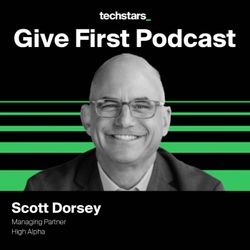
99. Building Startups and Lasting Relationships with Scott Dorsey
31:50||Ep. 99In this episode of the Give First podcast, Brad Feld talks with Scott Dorsey, co-founder of High Alpha and former CEO of ExactTarget, the email marketing pioneer acquired by Salesforce. Scott shares his journey from launching a startup with no technical background to building a company of 2,000 employees, going public, and running Salesforce Marketing Cloud.The conversation dives into why relationships and core values matter as much as product and market, how emotional intelligence shapes leadership, and what it means to mentor by guiding rather than controlling. Scott also reflects on failure, empathy for founders, and the importance of playing multi-turn games in venture.For founders wondering how to practice give first without being taken advantage of, Scott offers timeless advice: everyone can be both a mentor and a mentee, no matter where they are in their journey.Scott Dorsey ➡️ https://www.linkedin.com/in/scott-dorsey-096b393/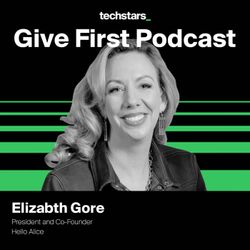
98. Breaking Barriers for Entrepreneurs with Elizabeth Gore
28:40||Ep. 98In this episode of the Give First podcast, Brad Feld talks with Elizabeth Gore, co-founder and president of Hello Alice, about what it takes to build and scale a platform serving over 1.5M small business owners.Elizabeth shares how Hello Alice became a critical lifeline during COVID, launching grant programs, pivoting product builds, and creating community hubs for entrepreneurs in crisis. She reflects on the tension of running a venture-backed social enterprise, the lessons from winning a landmark federal lawsuit, and how AI and open banking could transform access to capital for underrepresented founders.This conversation shines a light on the entrepreneurs who keep our communities running, and the technology helping them thrive.Follow Elizabeth Gore here 👉 https://www.linkedin.com/in/elizabethgoreusa/ Check out Hello Alice 👉 https://helloalice.com/